Julian Assange
636 weeks of deprivation of liberty for telling the truth
636 weeks of deprivation of liberty for telling the truth
In our previous articles, we have observed that censorship is increasing in social media, such as Facebook or YouTube, which systematically punish points of view that are not aligned with official policies on the health crisis. However, even if these spaces tend towards a monopoly of use, we can still claim that they are private spaces, governed by their own rules and to which we are not obliged to adhere(1).
So what about the public space? Is freedom of expression still guaranteed by our governments? Are independent media welcomed into the open arms of democracy?
On this point, I would like to give a nuanced answer. In France or in Belgium, we live in countries where expressing ourselves is possible, even encouraged. Journalists in our regions, until proven otherwise, do not risk their lives. While in other parts of the world, nearly 1,000 journalists have been killed in 10 years(2), some of them burned alive or cut into pieces. There is no question of this in our countries.
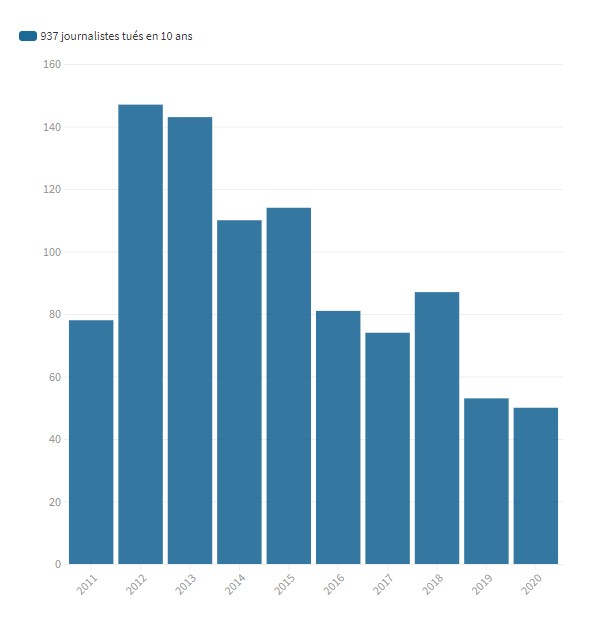
Does this mean that our journalists, in Belgium or in France, are warmly invited to government press conferences regardless of their values and vision? No. This is not true. In any case, the system is flawed and journalistic freedom was seriously tested during the health crisis.
Some breaches in the freedom of the press
In Belgium, the independent newspaper KAIROS, and its lead reporter Alexandre Penasse, who was removed from government conferences for several months after asking uncomfortable questions, was forced to hire a lawyer to regain access to the press room(3).
On the day of the conference, the journalist goes to the conference venue well in advance. His name is not on the guest list. However, it appears that the other journalists received a text message confirming the invitation. Alexandre Penasse summons his lawyer out of the blue and, as if by miracle, his name reappears on the list.
The Belgian government is playing on the string of censorship here. An outright ban would be illegal, so officials use other means: « forgetting » to list the invitations, « avoiding » the questions, and then, finally, « technically » cutting the microphone and rolling the credits, which hides the inconvenient question.
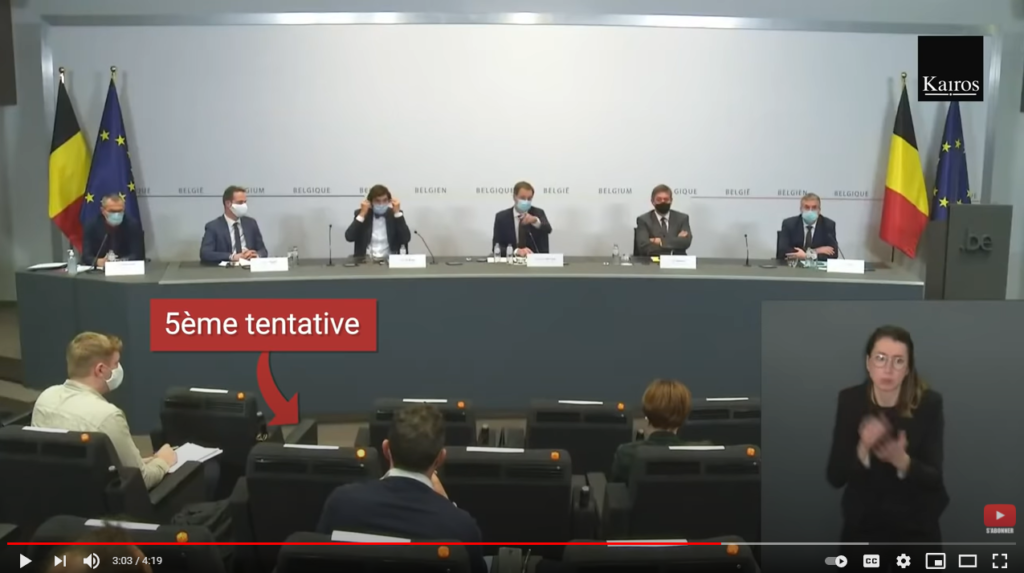
Accredited journalist Alexandre Penasse had to call on his lawyer to gain access to the government conference of November 27, 2020 in Brussels. Just as he was about to ask his question, his microphone was cut off and the credits started rolling at the end of the program.
In France, it is the newspaper France Soir that is under pressure. Quickly labeled a « den of conspiracy theorists » for being one of the few media outlets to offer a platform for alternative viewpoints, the France Soir newspaper was intimidated in January 2021 by the French Ministry of Culture.
On January 29, the Minister Roselyne Bachelot asked that the official certificate that gives France Soir its status as a political and general information media organization be re-examined. In the end, this certificate was not withdrawn, but the attitude of the department remains unusual, to say the least. Through the echo chamber of Twitter, the government has very clearly sent intimidating signals to the newspaper.
Xavier Azalbert, the Director of Publication of France Soir, reacts calmly: » The Minister has every right to speak out, » he says. I think it is a right and it must be respected […] There were times when we made mistakes and we have to admit it. But for the most part, we brought a dissonant, factual voice. And this has disturbed some people. « (4).
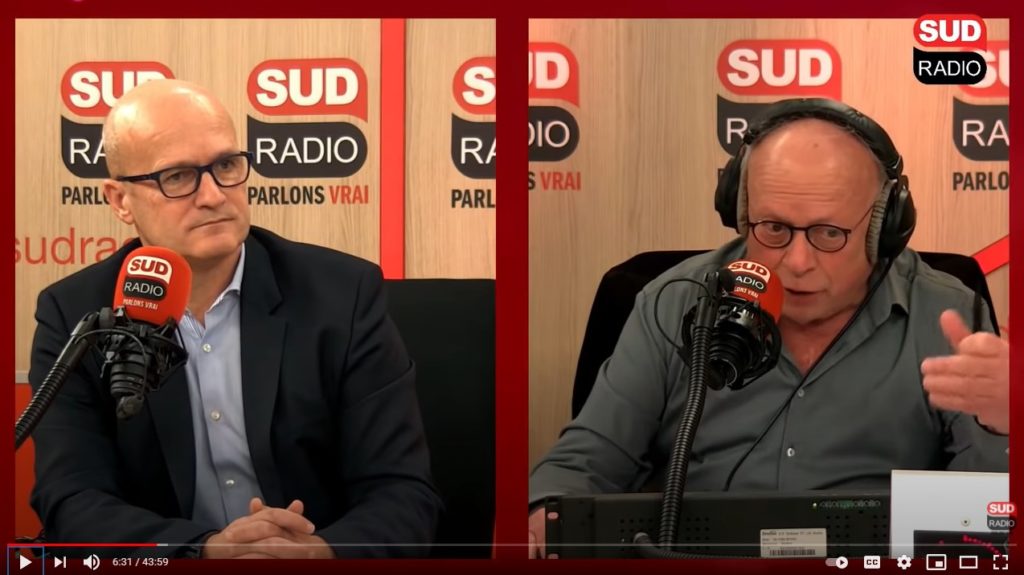
Human rights experts sound the alarm
From the beginning of the COVID-19 health crisis, human rights experts perceived a risk of abuse and quickly took action. Several experts from the Office of the High Commissioner for Human Rights have spoken out, as early as March 2020. They saw fit to remind states that » emergency powers should not be used to silence opposition « (5).
Referring to the measures of the state of emergency in the face of the COVID-19, the NGO Amnesty International, pinpoints several countries in its 2020 report:
» At a time when accurate, relevant and scientifically based information is urgently needed to combat the pandemic, a number of governments have imposed unwarranted restrictions on freedom of expression and access to information. In Armenia, Azerbaijan, Bosnia and Herzegovina, France, Hungary, Kazakhstan, Poland, Romania, Russia, Serbia, Tajikistan, Turkey, Turkmenistan, and Uzbekistan, existing and newly enacted laws have been abused to limit freedom of expression. « (6)
Have you noticed France, lost between Azerbaijan and Uzbekistan?
It is quite symptomatic to note that, in the summary of this report, presented by France Inter, it is the « authoritarian regimes » or countries such as Hungary, Poland or Vietnam that are singled out(7). It seems easy to see the mote in our neighbor’s eye and overlook the beam in our own.
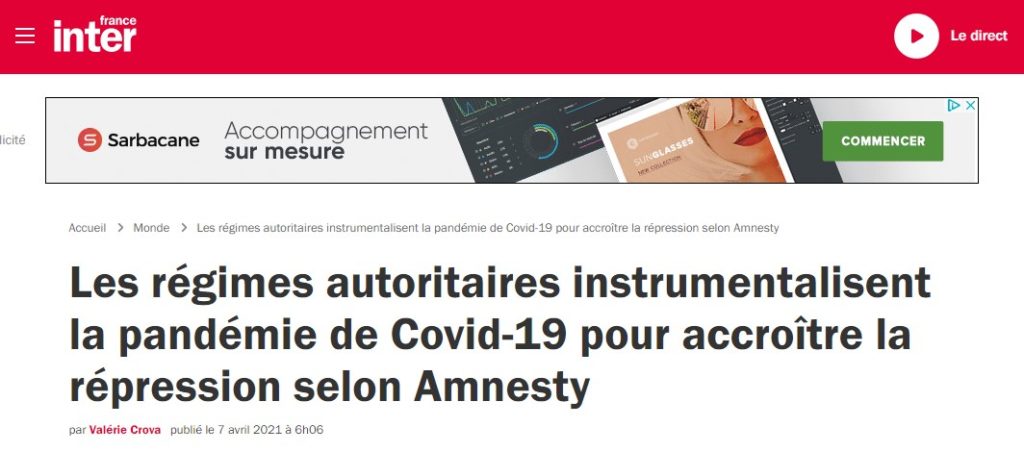
Further on, on page 211 of the report, France is again singled out by the humanitarian association: » The government’s response to the COVID-19 pandemic has raised a number of human rights concerns, including excessive use of force by the police and the right to freedom of peaceful assembly. »
A legal arsenal against the right to inform
Ten months. That’s how long it took the Macron government to trigger a first wave of indignation in the media sector, recalls Pauline Perrenot of the ACRIMED Media Observatory(8). What’s at stake? The law on the protection of business secrets. Enacted in July 2018, this law enshrines a restriction on the freedom of the press, under the protection of businesses. Despite an unprecedented mobilization of journalists’ unions and other media outlets, the law passed like a bullet.
The effects of this law were not long in coming, particularly in the pharmaceutical sector, well before the coronavirus crisis. In September 2018, the French National Agency for the Safety of Medicines (ANSM) invoked business confidentiality to justify withholding information about the manufacture of a drug whose adverse effects were questioned. A little later, in November 2018, it was Le Monde newspaper that ran into the business secrecy that prevents journalists from effectively investigating the dangers of certain medical implants. 36 organizations joined the newspaper Le Monde in its battle against business secrecy(9), but despite this mobilization, administrative appeals proved very slow and unsuccessful.
The business secrecy law is not the only initiative of the Macron government that affects the right to inform and the freedom of expression. For example, the law of May 25, 2021 for global security(10), Article 24 of which provides for penalties of up to one year’s imprisonment and a fine of 45,000 euros for the dissemination of videos in which police officers or gendarmes are identifiable. This prohibition applies when the purpose of disseminating these images is to » harm the physical or psychological integrity » of the persons concerned. A very vague notion, subject to interpretation and clearly likely to discourage field reporting by journalists or ordinary citizens.
» Police violence exists, our images attest to it, making it real in the eyes of the public. This even though the French authorities deny their existence and persist, once again, in wanting to make them invisible. It is this counter-power, necessary in a democracy, that the government and its parliamentary majority wish to take away from the citizens. [Without these tools, without the people who use them, how much police violence would have gone unnoticed? « A collective opinion published on the ACRIMED website and signed by several dozen organizations, journalists’ unions, academics and professional journalists(11).
A feature of France’s very recent laws affecting press freedom is that they take cases out of the hands of the 17th Chamber of the Tribunal de Grande Instance, which was created at the end of World War II precisely to protect freedom of expression. This is the same jurisdiction that the newspaper Le Monde described in 2013, against the backdrop of recent cases, as the « chamber of freedoms »(12).
The laws passed by the Macron government move cases to commercial courts (the « Business Secrecy » law), criminal courts (Nicole Belloubet’s statements on defamation) or allow them to be « extrajudicialized » (regulation by digital platforms under the « fake news » law).
« A move that implies depriving these cases of all the jurisprudence acquired since 1881, and of the skills of specialized judges to arbitrate between freedom of expression, public interest and attacks on individuals or legal entities, » explains Emmanuel Tordjman, a specialist in media law and Mediapart’s lawyer(13).
However, French and European jurisprudence, as you will see below, solidifies the sacred pillars of freedom of expression.
At the European level, it is neither censorship nor authoritarian drift that worries us, but disinformation and misinformation(14).
In a joint communication to the European Parliament, the European Council, the European Economic and Social Committee and the Committee of the Regions, the major European official bodies address the fight against disinformation. They intend to take action to « untangle the false from the true » in the context of the COVID-19 crisis(15).
This communication is a real aikido trick. You can feel, from the very first paragraphs, that freedom of expression is here instrumentalized in the service of a fight against information perceived as « false » or « destabilizing ». Actions that are put in place, in reality, to limit freedom of expression to the « politically accepted » or the « scientifically consensual » are done so… in the name of freedom of expression and the protection of democracies.
We play with fire. The rhetoric is similar to that of special powers: « I restrict freedoms to protect you. It opens the door to a dangerous game: the infantilization of the citizen by the governing structures.
Of course, misinformation and misinformation exist. And this has been the case since the beginning of time. And it is not only the naive citizens who are the potential victims. Even a platoon of journalists can fall into the trap of an untruth, as the Timisoara story attests, for example(16). Even an entire nation can fall into a rhetoric that distorts reality. History has shown that people « fall under hypnosis » more easily from the inside than from the outside(17).
This is the danger I see in this « parental » initiative of the European Union. Under the pretext of fighting against the dangers that threaten us from all sides (the influence of false information coming from Russia, dangerous conspiracy theorists who are enemies of democracies, etc.), this policy opens the door to the control of information and to the dictatorship of consensus.

Of course, on the Internet as well as on television, we come across false information. These range from a supposed deathbed quote from Steve Jobs(18) to false government statements(19), which although denied, sometimes continue to circulate for months or years on social networks.
Of course, we can understand that a State can consider protecting itself against the invasion of false information and rumors coming from foreign countries such as Russia and China, during election periods for example, since this information is likely to torpedo the proper functioning of democracy.
The problem is that the European Commission’s text is very broad. It lumps together cybercrime, fraud, and destabilization campaigns by foreign powers with « misinformation or false claims about health care » and « conspiracy theories that can undermine the cohesion of our societies ».
That’s it, the red line is crossed. Scientists who disagree with the official doctrine and citizens who criticize the system in place find themselves in the same « Fake » basket as cybercriminals or enemy countries. This is perhaps forgetting the fact that the balance of a democracy is based on checks and balances.
My fear is all the more justified at a time when eminent scientists from all over the world, some of them the best specialists in the world in the medical technologies that are in the news, are expressing an opinion that is at odds with the government’s position or with the institutional scientific committees. « The policy of fighting disinformation is now guillotining brilliant scientists, intellectuals, doctors, philosophers, who have nothing to do with sabotaging the social order, except that they contradict the rhetoric in place, the data and the reasoning on which it is based.
The analysis of the European discourse would be worth an article in itself. At this point, I am content to express extreme vigilance in the face of a discourse that claims to defend freedom of expression… by restricting and controlling it.
The principle is freedom of expression; the restriction is the exception. The freedom can only be infringed in case of abuse provided for by the law. These exceptions can be summed up in a few lines: insult, defamation, invasion of privacy, presumption of innocence, impersonation, harassment, slander. But recent laws have added to the list and made it more vague.
Apart from these exceptions, freedom of expression remains the rule. And the European Court of Human Rights (ECHR), through its rulings, makes a very broad interpretation:
… the right to be wrong
According to the European Court, the freedom of expression prevails « even in the presence of elements that strongly suggest that the information conveyed may be false » (ECHR, Court (Second Section), 6 Sept. 2005, n° 65518/01, §113).
… the right to shock
« Freedom of expression applies not only to information or ideas that are favourably received, or regarded as inoffensive or as a matter of indifference, but also to those that offend, shock or disturb the State or any section of the population » (ECHR, Handyside v. United Kingdom, 7 December 1976).
… the right to express unconventional ideas
In a judgment concerning a public health issue, the Court specified that freedom of expression cannot be limited to commonly accepted ideas: « In a field where certainty is unlikely, it would be particularly excessive to limit freedom of expression to the presentation of generally accepted ideas alone » (ECHR, 25 August 1998, Hertel/Switzerland, §50)(20).
This latest ruling of the European Court of Human Rights is full of wisdom. It preserves this indispensable flexibility in the face of those monolithic certainties that accompany minds that are fond of simple and clear-cut answers. At a time when the great inquisitors are verifying « fake news », it is time to remember the value of the dialectic of doubt. In science as in society.
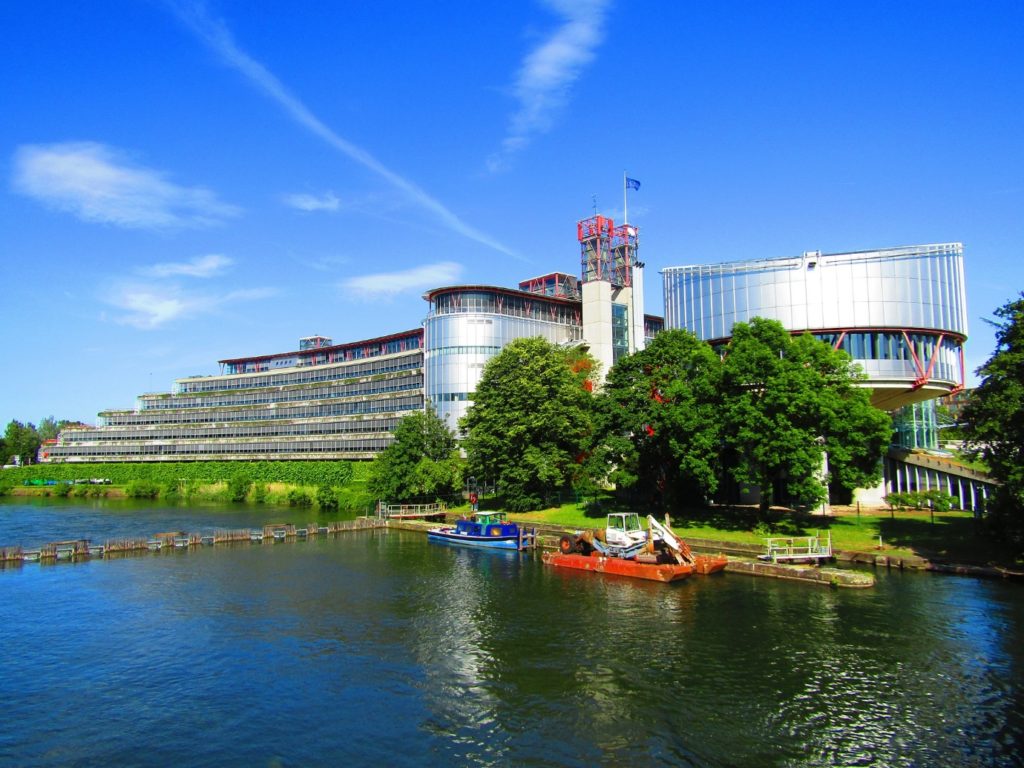
In conclusion, in our countries, freedom of expression remains a value and a reality, otherwise I would risk my life to post this article. But, in the shadow of the health crisis and the state of emergency, the attentive citizen will be able to see the black cloud of repression approaching. Under the virtuous appearances of a fight against misinformation, health protection or uncivil behavior, our democracies seem to have to defend themselves… against themselves! This is the paradox of the European Union’s position or the law for global security.
A democracy that denounces irreverence borders on totalitarianism. And history has shown that the narrative of fear and insecurity is often at the root of these temptations to restrict free speech and free thought. Yet these freedoms are the DNA of a true democratic society.